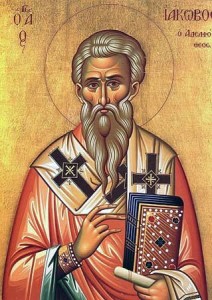 Saint James the Just, one of Christianity’s early leaders, counsels readers across the ages to be patient but productive while waiting for the fulfillment of God’s promises. The canonical epistle composed by James (or by his community of disciples) urges his audience—“The Twelve Tribes of the Dispersion”—to be patient and to continue to live holy lives in keeping with the teachings of Jesus, who the gospels say was James’s brother.
Saint James the Just, one of Christianity’s early leaders, counsels readers across the ages to be patient but productive while waiting for the fulfillment of God’s promises. The canonical epistle composed by James (or by his community of disciples) urges his audience—“The Twelve Tribes of the Dispersion”—to be patient and to continue to live holy lives in keeping with the teachings of Jesus, who the gospels say was James’s brother.
In James’s time members of the Way believed that the return of the Lord would happen in their lifetimes. So did James. He writes, “Be patient. The day of the Lord is at hand and so you must remain firm in your faith” (Jas 5:8). Christianity is about waiting. Wait, but work for what you await and prepare as many people as possible to receive the promised inheritance. “You need endurance to do the will of God and to receive what he has promised” (Heb 10:36).
James was a common name in the first century Church. James the son of Zebedee and brother of John the Beloved Disciple was a prominent character in the gospels, one of the “gang of three” along with John and Peter, who witnessed the Transfiguration and other miracles. The other James—the Just, the Lesser, the Brother of the Lord— was the author of the general epistle that bears his name. Mark and John in their gospels confirm that Jesus had brothers but James was among the kin of Jesus who believed that “he was out of his mind.” Eventually James came to believe that Jesus was who he said he was and so the kingdom of God at hand was much closer then James first believed.
James had a significant period of formation that changed him into a believer. The letter he wrote is grounded in Old Testament wisdom literature and sayings of Jesus from the Sermon on the Mount. Even if James wasn’t standing at the base of the mountain that day when Jesus preached on the kingdom, he grew to know the Word of God. Like Saint Paul, James received a visit from the Risen One and it changed his life. In AD 40, 10 years after the Resurrection, he assumed the role as the first bishop of Jerusalem. Seeing is believing and James came to believe that his brother was the Son of God.
Now James understood the necessity of preparing for the unseen and the unforeseeable. In writing his letter he drew upon Old Testament metaphors to connect with an agrarian audience within the Church but in need of reform. Every winter and spring the rains produced nourishment to bring crops to life. Such descriptions were used to enumerate God’s gift and his mastery over creation. “God gives us the rain, early and late, in its time, and he watches over us in the appointed weeks of the harvest” (Jer 5:24).
Nature, like faith, can’t be forced to grow but happens in its own time according to the designs of the Creator. Neither can faith be coaxed into rapid growth if it is not planted firmly on well-tilled soil. Patience is as much a part of faith as is the belief that spurs and nurtures the faith. For James that meant being patient while maintaining hope in God’s promise. “Take as an example of hardship and patience, brothers and sisters, the prophets who spoke in the name of the Lord” (Jas 5:10).
That means waiting for what we cannot see but remaining firm in our believe that what was spoken to us by the prophets of the Old Testament and the evangelizers of the New Testament to be true.
Christianity is a religion of joy. In Advent we celebrate the two-fold reality of the birth of Christ while anticipating his return at the end of time. This is cause for rejoicing, and the anticipation of waiting for these great realities also means that we spend our lives waiting for what Jesus said would be fulfilled. Gaudete Sunday, this third Sunday of Advent, serves as a reminder of the joy set to unfold between now and Christmas and the thrill and wonder of what it will be like to see the Son of Man coming on the clouds of heaven with the angels in the sky.



